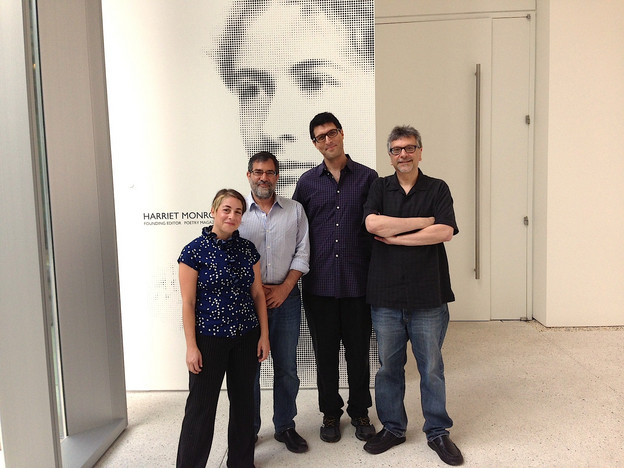
Remote yet present (PoemTalk #82)
Carl Rakosi, 'In What Sense I Am I'

Anthony Madrid, Laura Goldstein, and Don Share joined Al Filreis at the Poetry Foundation in Chicago for a special on-the-road PoemTalk episode, a discussion of Carl Rakosi’s poem “In What Sense I Am I.” The poem appeared in Rakosi’s Collected Poems in the mid-1980s, but otherwise the group was not able to date the poem except through internal evidence — and there’s plenty of that — although taken all together such evidence leaves things open — for instance, the reference to Eliot’s Prufrock. Led by Anthony in particular (who worked out lineation and grammar in an experimental way) the group also pondered the style of line and stanza to guess at whether the poem is early or late. Al insisted on late, influenced not just by the theme of remoteness from self but also by the event in which our recording of Rakosi performing this poem was made. It was a day or two after Rakosi had turned ninety-nine years of age, an audiocast bringing Rakosi’s voice into the Kelly Writers House in Philadelphia and thence out to the world of live Internet listeners. We hear the voice of a very elder ly poet remembering how the self gets membered in the writing, “barely discernible” (both Prufrock and himself) and “seemingly ageless.”
ly poet remembering how the self gets membered in the writing, “barely discernible” (both Prufrock and himself) and “seemingly ageless.”
Because — and the group admires this about the poem — the distinct scenes and references do not cohere, it was difficult to say with any certainty what the poem is “about.” But Al asked anyway. Is it about the way in which the question about what constitutes a written self can only be answered“as in a dream” and is thus dream-like? Is it about how such a question consistently “escapes me”? Or is about the way posing such a question about the self leads one inexorably back to thoughts about poets’ “original impulse / to sing” — the originary (“neolithic,” Al suggests) bodying of breathing and voice? Is that what explains the “intentionally naive” (Don’s phrase) presentation of the woman as muse or interior paramour, trapped with the poem-in-the-making inside the voice or breath of poem?
Rakosi was born in Berlin, lived in Hungary until he was seven, but then commenced some Chicago connections that make it perhaps apt that PoemTalk set up camp in this windy city to talk about him: he lived in Chicago for a while, where his father was a watchmaker, and despite the family’s meager means his parents contrived to send him to the University of Chicago; and later it was in Chicago, in Poetry magazine, that Rakosi’s poems were published as part of the famous Objectivist issue of the magazine in 1931.
For the first time in the PoemTalk series, we also offer a bonus track. Laura, Don, and Al were mesmerized by Anthony’s description of his unusual critical metrical practice and asked him to describe it in what turn out to be not just analytical but also pedagogical terms. Listen here to hear that extra talk!
This special episode of PoemTalk was engineered by Ed Hermann and edited once again by Allison Harris. And we wish to thank the staff of the Poetry Foundation for helping us organizing this Chicago trip and the recording session. The text of Rakosi’s poem can be found here.